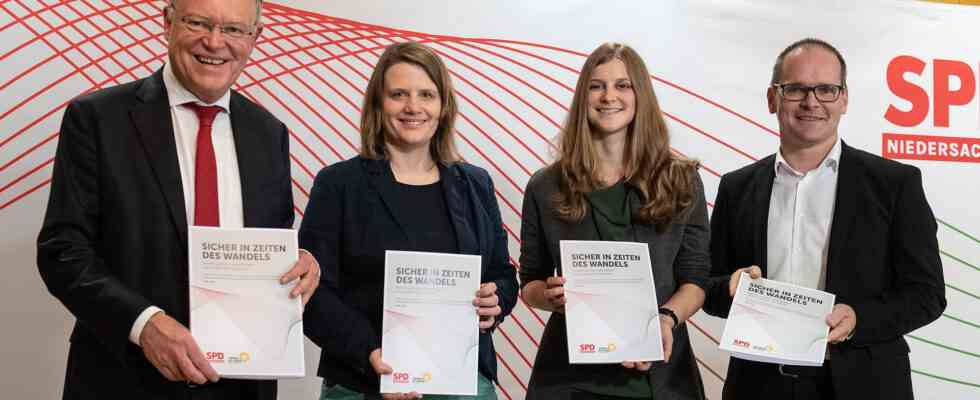analysis
Status: 01.11.2022 20:01
23 days after the election, the SPD and the Greens in Lower Saxony presented their coalition agreement. In focus: investments, educational policy and stability. Many points remain vague – the parties want to take action.
Anyone who expects big surprises from Stephan Weil (SPD) will quickly be disappointed. The 63-year-old prime minister-elect sees himself more as a man of stability, as a guarantor of security. So it’s no wonder that the red-green coalition agreement entitled “Safe in times of change”.
After just five days of negotiations, the SPD and the Greens presented the paper in Hanover – two days earlier than originally planned. In the crisis phase, the two parties are primarily concerned with two things: form a government quickly and be able to act as quickly as possible. After all, the constituent session of the state parliament is already on November 8th.
Greens represented as strongly as never before
Instead of conflicts, there are therefore compromises – and that also applies to the ministries. While the Greens, with four out of ten ministries, are more strongly represented in the state government than ever before in Lower Saxony, they also had to cope with losses. The designated Vice Prime Minister Julia Willie Hamburg (Greens) has not succeeded in winning over the planned economic department. Instead, she takes over the Ministry of Education.
The 36-year-old sits in the ejection seat. Although she has made a name for herself as an education expert for the Greens in the state parliament for years, it is already clear that there is a shortage of teachers, class cancellations and the lack of progress in digitization can hardly be combated in five years. It is difficult for her to gain anything with the education department in these times. Nevertheless, she benefits from the fact that the Greens will also provide the new finance minister. So Hamburg can hope for a more open hand.
Emergency aid via supplementary budget
The fact that the future red-green state government will focus on investments is also reflected in the coalition agreements: primary, secondary and secondary school teachers in Lower Saxony are to be paid according to A13 in the future. Cost point: Between 220 and 300 million euros annually. In addition, the schools should at least be able to hire other staff with the money from vacant positions.
The SPD and the Greens are also planning to dig deep into their pockets in other ways: With the help of a supplementary budget, they want to initiate emergency aid of one billion euros to cushion the social and economic consequences of the energy crisis. A state housing association is to create more social housing, and a 29-euro ticket should make train travel cheaper for young people.
Escape the debt brake
In addition, red-green want to set up a Lower Saxony fund – a means to escape a little from the debt brake anchored in the Lower Saxony constitution. “We know the legal framework. But we also know that the debt brake offers the possibility of alternatives, and we want to use these possibilities,” said Weil.
The investment promise also applies to climate protection. Lower Saxony wants to expand renewable energies and has set itself ambitious goals: emissions are to be reduced by 75 percent by 2030. Lower Saxony wants to be completely climate-neutral by 2040. The Ministry of the Environment will therefore also become the Ministry of Climate Protection. All projects of the new state government are to be subjected to a climate check.
Federal political issues omitted
The coalition agreement names a few cornerstones, but remains one thing on some points: vague. Many plans are sketched out, but not backed up with concrete measures. There are probably pragmatic reasons for this: Lower Saxony is facing a major process of change, but at the same time the various crises are also demanding a lot of additional money. The coalition agreement therefore also bears the signature of the compromise.
The fact that the parties will agree to the agreement at the party conferences next weekend should only be a mere formality. Because there are no points of friction: This can also be seen from the fact that federal political issues such as the Emsland nuclear power plant or the expansion of the motorways were largely left out. Instead of having identity debates, both parties want to take action.
And the designated state government wants to start doing this as soon as possible: the new state parliament is to decide on the rescue package for the people of Lower Saxony in November.

